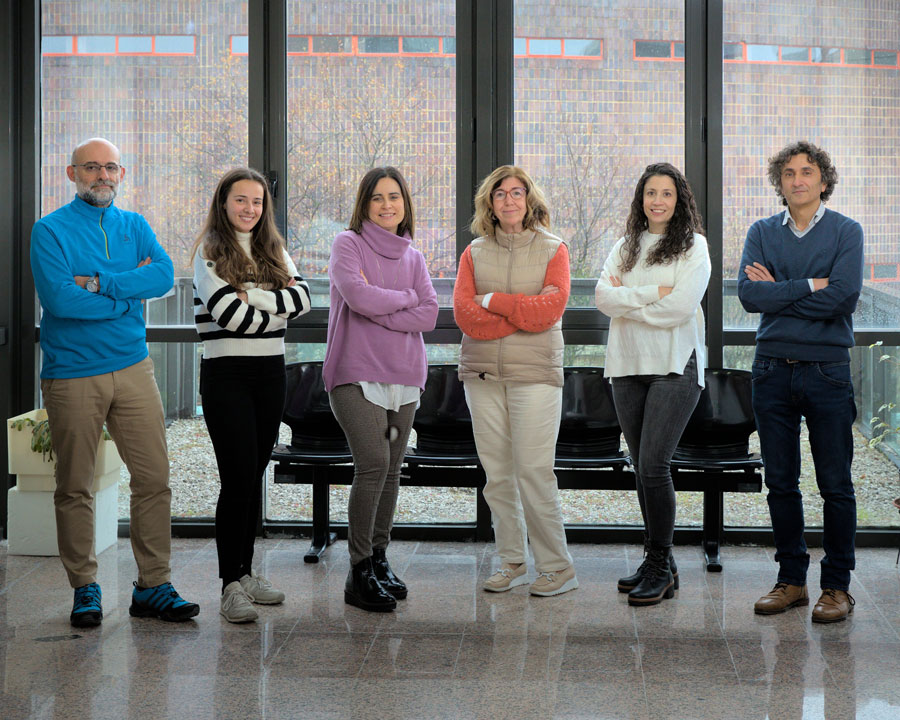UNIT HEADS
Carmen Rodríguez Sánchez
Vanesa Martín Fernández
LOCATION
Facultad de Medicina. Departamento de Morfología y Biología Celular

RESEARCH LINES
Our group is focused in the study of the antitumor capacity of natural antioxidants and newly synthesized antitumor molecules when administered individually and also of their ability to enhance the efficacy of conventional chemotherapy. We are interested in the signaling pathways that mediate these effects, in order to search for new therapeutic approaches using these molecules in combination with other antitumor drugs and/or to use them in particular tumors in a targeted way. In addition to the classic pathways triggered by the activation of tyrosine kinase or death receptors, we are especially interested in the study of the cellular redox state and the interdependence of these pathways with tumor metabolism, since its role in the initiation and progression of cancer is well established. These studies are carried out in commercially available cancer cell lines, in cancer cells from patients -both cancer stem cells and bulk cells- and also in experimental animal models.
At present we focus on the following specific research areas:
Study of the cytotoxic action of the naturally occurring indolamine melatonin and new kinase inhibitors in Ewing’s sarcoma and hematological tumors. These studies are performed on commercial cell lines and on patient cells. Studies are also carried out inducing tumors in vivo by administering cancer cells transfected with luciferase for image monitoring (IVIS: In Vivo Image System) in immunocompromised NOD/S mice.
Evaluation of the antitumor action of melatonin and the novel kinase inhibitors in human glioblastoma cancer stem cells and tumor stroma. The studies are performed in cancer stem cells obtained from patients through the Tumor Bank and commercial cell lines as whole tumor stromal cells. In vivo experiments are performed by implantation of human glioblastoma stem cells in the brain of Balb / c-nu nude mice. This model provides a faithful replica of the tumor patient in the mouse unlike experimental models where stromal cells of the whole tumor or commercial cell lines are implanted. The in vivo tracking of the tumor is done by magnetic resonance imaging (MRI).
Study of the antitumoral efficacy of combinations of these substances with conventional chemotherapy. These studies are of particular interest in the case of the combination of conventional chemotherapeutic or newly synthesized drugs with melatonin (that has little or no relevant side effects). Melatonin has been shown to decrease the expression of the drug transporter ABCG2 in human glioblastoma both in the case of tumor stromal cells and cancer stem cells, reducing the LD50 of chemotherapeutic studied for both cell groups.
Study of the differences in tumor biology of various types of cancer -especially in terms of basal metabolism and redox state- and its modification after the administration of melatonin and other antioxidant molecules. Various natural antioxidants, such as resveratrol or melatonin, show different antitumor effects depending on the type of cancer: in most cases they inhibit cell proliferation while in some cases they induce cell death and a rapid increase in intracellular oxidants. The specific objectives of these studies are: a) to obtain information on what could be the target and the key points of the cytotoxic action of these compounds based on the metabolic differences between tumor groups; b) to predict types of tumors sensitive to the different effects of these substances; c) to be able to rationally combine melatonin or other antioxidants with few or no side effects, with other antitumor drugs already in use to reduce the dose of the latter and, therefore, their adverse effects; d) to advance in the knowledge of tumor metabolism and the use of new drugs that act on new therapeutic targets in relation to said metabolism.
GROUP HEAD BIOGRAPHY
Carmen Rodriguez Sánchez studied Medicine at the University of Oviedo, graduating in 1982. She received her PhD in 1989 at the Department of Morphology and Cell Biology. She made a postdoctoral stay of 6 months (1989) at the University of Aberdeen, Scotland, UK. Then in 1990 and 1991, she made another postdoctoral stay of two years in the Department of “Cell and Structural Biology” of the “University of Texas Health Science Center at San Antonio” (UTHSCSA), San Antonio, TX, USA, in the laboratory of Dr. Russel J. Reiter. There she began her investigation into the actions of melatonin and intracellular signaling pathways regulated by this molecule. She is Full Professor of Anatomy and Human Embryology at the University of Oviedo. The group she led has been decisively contributing since 1995 to the understanding of the action of melatonin, especially its ability to regulate gene expression (ALA-S, antioxidant enzymes); its cytoprotective action on healthy cells and tissues (work performed mainly in nervous system); and its antitumor action.
SELECTED PUBLICATIONS
- Rodríguez C, Puente-Moncada N, Reiter RJ, Sánchez-Sánchez AM, Herrera F, Rodríguez-Blanco J, Duarte-Olivenza C, Turos-Cabal M, Antolín I, Martín V. Regulation of cancer cell glucose metabolism is determinant for cancer cell fate after melatonin administration. J Cell Physiol 2021, 236:27-40.
- Puente-Moncada N, Turos-Cabal M, Sánchez-Sánchez AM, Antolín I, Herrera F, Rodriguez-Blanco J, Duarte-Olivenza C, Rodriguez C, Martín V. Role of glucose metabolism in the differential antileukemic effect of melatonin on wild‑type and FLT3‑ITD mutant cells. Oncol Rep 2020, 44:293-302.
- Puente-Moncada N, Costales P, Antolín I, Nuñez LE, Oro P, Hermosilla M, Pérez-Escudero J, Ríos-Lombardía N, Sánchez-Sánchez AM, Luño E, Rodriguez C, Martín V y Morís F. The multikinase inhibitor EC70124 display potent activity in preclinical models of acute mieloid leukemia. Mol Cancer Ther 2018, 17:614-624.
- Rodriguez-Blanco J, Pednekar L, Penas C, Li B, Martin V, Long J, Lee E, Weiss WA, Rodriguez C, Mehrdad N, Nguyen D, Ayad N, Rai P, Capobianco AJ, Robbins DJ. WNT signaling drives SHH-subgroup medulloblastoma growth. Oncogene 2017, 36:6306-6314.
- Letra-Vilela R, Sánchez-Sánchez AM, Rocha AM, Martin V, Branco-Santos J, Puente-Moncada N, Santa-Marta M, Outeiro TF, Antolín I, Rodriguez C, Herrera F. Distinct roles of N-acetyl and 5-methoxy groups in the antiproliferative and neuroprotective effects of melatonin. Mol Cell Endocrinol 2016, 434:238-49.
- Sánchez-Sánchez AM, Antolín I, Puente-Moncada N, Suárez S, Gómez-Lobo M, Rodriguez C, Martín V. Melatonin cytotoxicity is associated to Warburg effect inhibition in Ewing’s sarcoma cells. Plos One. 2015, 10:e0135420.
- Martín V, Herrera F, Sanchez-Sanchez AM, Puente-Moncada N, Gomez-Lobo M, Antolín I, Rodriguez C. Involvement of autophagiy in melatonin-induced cytotoxicity in glioma initiating cells. J. Pineal Res. 2014, 57:308-316.
- Rodriguez C, Martín V, Herrera F, García-Santos G, Rodriguez-Blanco J, Casado-Zapico S, Sanchez-Sanchez AM, Suárez S, Puente-Moncada N, Anítua MJ and Antolín I. Mechanisms involved in the pro-apoptotic effect of melatonin in cancer cells. Int. J. Mol. Sci. 2013, 14:6597-6613.
- Martín V, Sanchez-Sanchez A, Herrera García F, Gomez-Manzano C, Fueyo J, Alvarez Vega MA, Antolín I and Rodriguez C. Melatonin-induced methylation of the ABCG2/BCRP promoter as a novel mechanism to overcome multidrug resistance in brain tumor stem cells. Br. J. Cancer 2013, 108:2005-2012.
- Garcia-Santos G; Martin V; Rodriguez-Blanco J; Herrera F; Casado-Zapico S; Sánchez-Sánchez AM, Antolin; Rodríguez C. Fas/Fas ligand regulation mediates cell death in human Ewing’s sarcoma cells treated with melatonin. Br J Cancer 2012, 106:1288-1296.

MEMBERS
| Name | Possition | Phone | |
| Carmen Rodríguez Sánchez | Full Professor | carro@uniovi.es | 985103057 |
| Isaac Antolín González | Full Professor | Iantolin@uniovi.es | 985103671 |
| Vanesa Martín Fernández | Professor | martinvanesa@uniovi.es | 985103615 |
| Marco Alvarez Vega | Clinical researcher | mavega@uniovi.es | 985103000 Ext 5223 |
| María Turos Cabal | Predoctoral fellow | maria_turos27@hotmail.com | 985103000 Ext 5223 |
| Ana Mª Sánchez Sánchez | Assistant Professor | sanchezmaria@uniovi.es | 985103000 Ext 5223 |
| Noelia Puente Moncada | Assistant Professor | puentenoelia@uniovi.es | 985103000 Ext 5223 |

